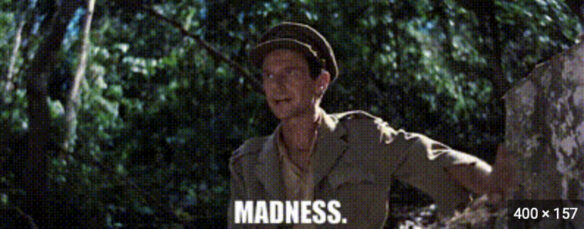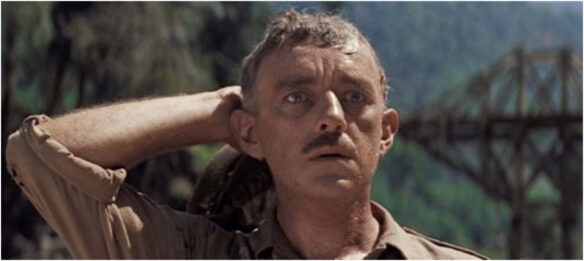“The Bridge on the River Kwai” is on its surface a movie about tremendous courage and tenacity during World War II. The movie, made in 1957 by Director David Lean, tells the story of mostly British POWs overcoming hardship to build a bridge for their Japanese captors in Burma (now Myanmar). The movie won the Academy Award for best picture in 1957 and has been widely praised and studied by film buffs.
The real message of ‘River Kwai’ is how human beings lose their ability to reason under pressure. War causes even virtuous goals like courage and integrity and discipline to be twisted into evil purposes. The real message is that human beings can quickly descend into insane and destructive behavior while claiming they are doing “something good.”
The last few words of the movie are “Madness! Madness!” said by one of the few sane observers, the Dr. Clipton (James Donald).

The movie’s first act involves a heroic battle of wills between the Japanese concentration camp commander Col. Saito and the British commander of the POWs, Lt. Col. Nicholson (Alec Guinness). For you younger folk, you may know Alec Guinness as Obi Wan Kenobi from the older Star Wars movies.
Col. Saito tells the British that they must all work on building a massive railway and bridge across a nearby river. He says the officers must also work, which is a violation of the Geneva Convention. Lt. Col. Nicholson refuses. Col. Saito threatens to shoot all of the officers until he is convinced by Dr. Clipton that this would be a crazy act. Finally, Nicholson is confined to a small metal hut where he rots away for days.
Meanwhile, the bridge is not progressing. The British soldiers are (quite sanely) using passive resistance to delay the project, which will only further the Japanese war effort. The British soldiers realize their duty is to win the war, and it won’t help win the war if they build a bridge that benefits the Japanese. The British soldiers are enjoying life, diving into the river to keep cool in the tropical heat, and playing a game of cat and mouse with their captors. We learn that Saito will be forced to kill himself if he doesn’t finish the bridge on time, so the British passive resistance makes a lot of sense.
Eventually Nicholson gets his way and Saito agrees that the officers do not have to do manual labor. Nicholson is treated like a hero by the British troops. But then his madness begins to manifest itself. He decides that he will show Col. Saito how brilliant the British are by building the bridge with British administration. He promises he will get the bridge built on time after all.
So, a British officer decides to help the Japanese war effort and save the life of the evil and crazy Japanese commander during wartime. Talk about treason!
Nicholson justifies this by saying that it will help the soldier’s morale and discipline to keep them busy. But his maniacal focus on building the bridge causes him to force sick men out of the hospital so that they join the construction effort. At the end, he even convinces British officers to work with the men after all, which was the cause of his disagreement with Col. Saito. And when the bridge is done, he puts a plaque on it pointing out that the British helped build it!!!
Meanwhile, one of the POWS, an American layabout played by William Holden who nevertheless represents the sane perspective of the viewers, escapes from the camp and makes his way to Ceylon (now Sri Lanka). He is blackmailed into joining a group of commandoes parachuting into the Burmese jungle to destroy the bridge. They are led by another hyper-focused British officer Maj. Warden who ends up killing his own men to make sure the attack succeeds. The American (Commander Shears) just wants to lay on the beach, avoid the war and make out with nurses, and given the alternatives, that seems like a very good choice. But of course he is not allowed to do this because of the sense of duty imposed by the British officer.
Commander Shears’ famous line, which he yells at the British officer Maj. Warden, sums up the perspective of the sane observer: “With you, it’s just one thing or the other: destroy a bridge or destroy yourself. This is just a game, this war. You and Colonel Nicholson, you’re two of a kind. Crazy with courage. For what? How to die like a gentleman. How to die by the rules. When the only important thing is how to live like a human being.”
The climax of the movie comes when the commando team arrives to blow up the bridge. They set explosive charges and run a line of wire from the explosive charges to a plunger that must be depressed manually a half-mile away. Nicholson spots the line, and in a maniacal desire to protect the bridge (the same bridge that is helping the Japanese war effort and the same bridge that British commandoes are trying to destroy), he finds Col. Saito and leads him to a member of the commando team hiding behind a rock. The commando kills the Japanese colonel, and then Col. Nicholson attacks the commando!! Commander Shears dies trying to make sure the plunger is depressed so the explosives go off. Col. Nicholson recognizes Commanders Shears as a POW escapee and he realizes that his side in the fight wants to destroy the bridge. Suddenly it all comes crashing down on him that his maniacal focus on building the bridge meant he betrayed his own cause. He utters the classic phrase of the movie: “what have I done?”

Maj. Warden mortars his own men, and Col. Nicholson is mortally wounded. He falls on the plunger when he dies, and the bridge is destroyed. Dr. Clipton observes the scene and says, “Madness!” over and over again.
The primary source of the madness is, of course, Col. Nicholson. His focus on a few good things (discipline and order among his troops and the goal of finishing the bridge) causes him to lose sight of the big picture. His real purpose as a soldier is to defeat the Japanese. It is not just about accomplishing goals and keeping up morale. The sane thing for him to do would have been to continue the passive resistance of his soldiers.
But there are two other sources of madness. Col. Saito is a self-destructive and petty camp leader who is willing to kill every man to achieve harmony in the camp and save his own life. But his methods always backfire. He believes the British troops are cowards for surrendering and being taken captive, even though they were ordered to surrender. And then there is Maj. Warden, who is shot in the foot but is driven by duty to march through the jungle to destroy the bridge because it will make “a jolly good show.” And then he kills his own men on purpose during the attack and justifies it because they should not be taken captive alive.
In all three cases, the crazy people are motivated by causes that seem to them important but are not that important in the big picture. They are willing to kill for their causes and die for their causes. They show courage and tenacity, but forget their real purpose.
Unfortunately, we in 2022 have seen a lot of madness lately. People are laser-focused on causes that seem proper to them without considering the long-term cost of these causes. I am thinking of the COVID lockdowns and the mandates and the vaccines, but I am also thinking of the endless government spending, the inflation we all suffer from, the military spending for useless wars in Ukraine and the Middle East, and all of the sexual and gender issues we are facing as a society. Too many of us think we are doing something good when we are really not looking at the big picture and what our purpose on Earth should be.
If we focus on the big picture — ie, the things the prophets tell us to focus on — we are on the right track. If we are doing what Jesus would do, we are fulfilling our true purpose. If we are fooled by short-term goals, we are no better than Col. Nicholson building a bridge for the enemy. We will reach a point of clarity and say to ourselves, “what have I done?” I would not wish that on anybody.


I like the theme here of getting too focused on a short-term good, and letting that focus shift you away from long-term good. The bridge was a great bridge, but it was built for all the wrong reasons in service to an ultimately terrible goal. Destroying the bridge was also a great goal, which was pursued with such tenacity that needless death was the result.
We do this all the time on a smaller scale when we litmus-test one another’s purity. The classic funny example are the Utards who think you’re a bad person if you drink Dr. Pepper, but it can get way worse and way thornier than that. And we live in a thorny time.
Lattertarian, this is exactly my concern of where we are as church members and as a society.
So, as Church members we get really concerned about minor issues and rules instead of dedicating our hearts to Jesus.
In society, we worry about the elderly during the COVID pandemic but we destroy the rest of society. We spend trillions and get in debt for short-term concerns without worrying about how our children and grandchildren will pay the debt. We spend billions on wars overseas without worrying about the people at home who are suffering. We worry about the feelings of a very small group of people who have gender dysphoria rather than the rest of society that does not.
I would argue that most of our problems these days are because of blind, crazy short-term thinking that ignores the long-term good.
I’ve have long marveled how the tail is constantly wagging the dog in our society. Such myopic views have long-lasting repercussions on everyone. No one is immune to these decisions. As President Oaks taught, we need to constantly ask ourselves, “Where will this lead?” I’m afraid in our pleasure-saturated societies that the Spirit is gradually withdrawing, for we know that the Spirit will cease to strive with men and women, and I would argue that we are seeing the effects of that now.